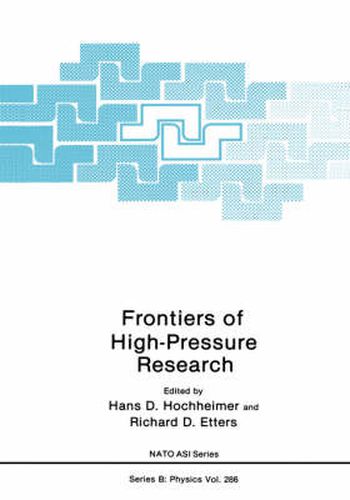Readings Newsletter
Become a Readings Member to make your shopping experience even easier.
Sign in or sign up for free!
You’re not far away from qualifying for FREE standard shipping within Australia
You’ve qualified for FREE standard shipping within Australia
The cart is loading…






This title is printed to order. This book may have been self-published. If so, we cannot guarantee the quality of the content. In the main most books will have gone through the editing process however some may not. We therefore suggest that you be aware of this before ordering this book. If in doubt check either the author or publisher’s details as we are unable to accept any returns unless they are faulty. Please contact us if you have any questions.
The role of high pressure experiments in the discovery of supercon ducting materials with a T. above liquid nitrogen temperature has demon strated the importance of such experiments. The same role holds true in the tailoring of materials for optoelectronic devices. In addition, much progress has been made recently in the search for metallic hydro gen, and the application of high pressure in polymer research has brought forth interesting results. These facts together with the suc cess of previous small size meetings (such as the First International Conference on the Physics of Solids at High Pressure , held in 1965 in Tucson, Arizona, U. S. A. ; High Pressure and Low Temperature Physics , held in 1977 in Cleveland, Ohio, U. S. A. ; and Physics of Solids Under High Pressure , held in 1981 in bad Honnef, Germany), motivated us to organize a workshop with emphasis on the newest results and trends in these fields of high pressure research. Furthermore, it was intended to mix experienced and young scien tists to realize an idea best expressed in a letter by Prof. Weinstein: I think it is an excellent idea. I have often felt that the number of excellent young researchers in the high pressure field need an opportu nity to put forward their work with due recognition.
Thanks to the support of the key speakers, we were able to achieve this goal and had more than 50\ young participants.
$9.00 standard shipping within Australia
FREE standard shipping within Australia for orders over $100.00
Express & International shipping calculated at checkout
Stock availability can be subject to change without notice. We recommend calling the shop or contacting our online team to check availability of low stock items. Please see our Shopping Online page for more details.
This title is printed to order. This book may have been self-published. If so, we cannot guarantee the quality of the content. In the main most books will have gone through the editing process however some may not. We therefore suggest that you be aware of this before ordering this book. If in doubt check either the author or publisher’s details as we are unable to accept any returns unless they are faulty. Please contact us if you have any questions.
The role of high pressure experiments in the discovery of supercon ducting materials with a T. above liquid nitrogen temperature has demon strated the importance of such experiments. The same role holds true in the tailoring of materials for optoelectronic devices. In addition, much progress has been made recently in the search for metallic hydro gen, and the application of high pressure in polymer research has brought forth interesting results. These facts together with the suc cess of previous small size meetings (such as the First International Conference on the Physics of Solids at High Pressure , held in 1965 in Tucson, Arizona, U. S. A. ; High Pressure and Low Temperature Physics , held in 1977 in Cleveland, Ohio, U. S. A. ; and Physics of Solids Under High Pressure , held in 1981 in bad Honnef, Germany), motivated us to organize a workshop with emphasis on the newest results and trends in these fields of high pressure research. Furthermore, it was intended to mix experienced and young scien tists to realize an idea best expressed in a letter by Prof. Weinstein: I think it is an excellent idea. I have often felt that the number of excellent young researchers in the high pressure field need an opportu nity to put forward their work with due recognition.
Thanks to the support of the key speakers, we were able to achieve this goal and had more than 50\ young participants.